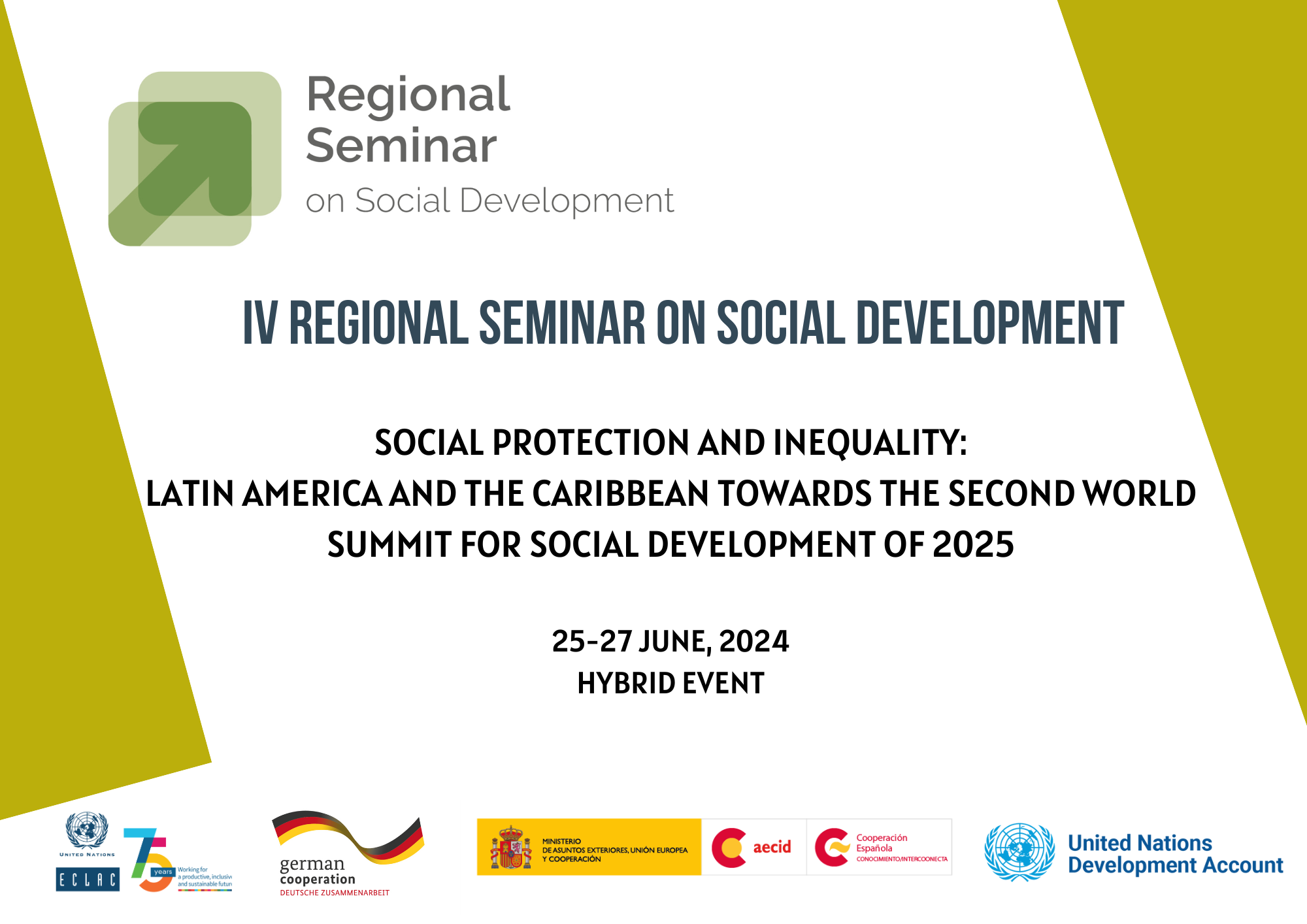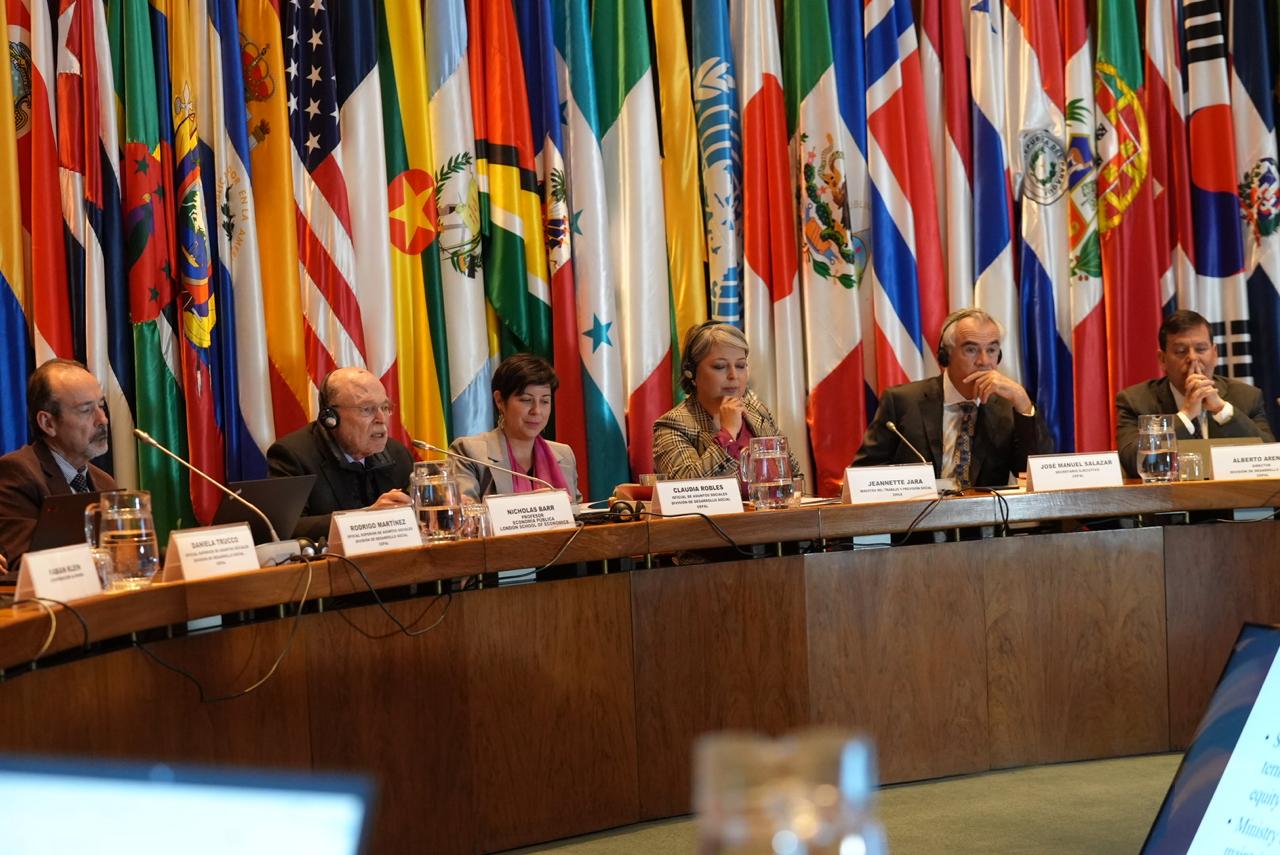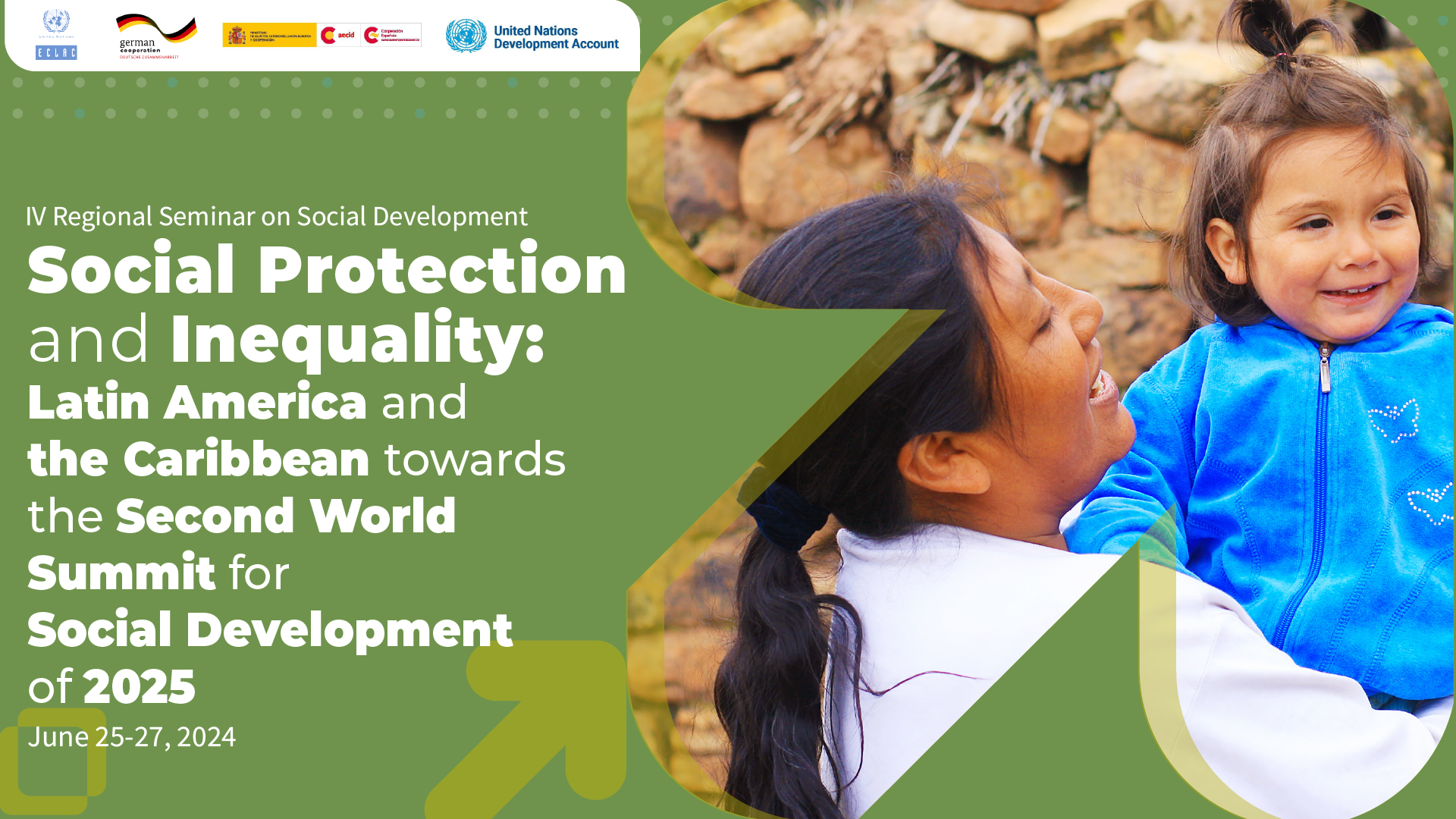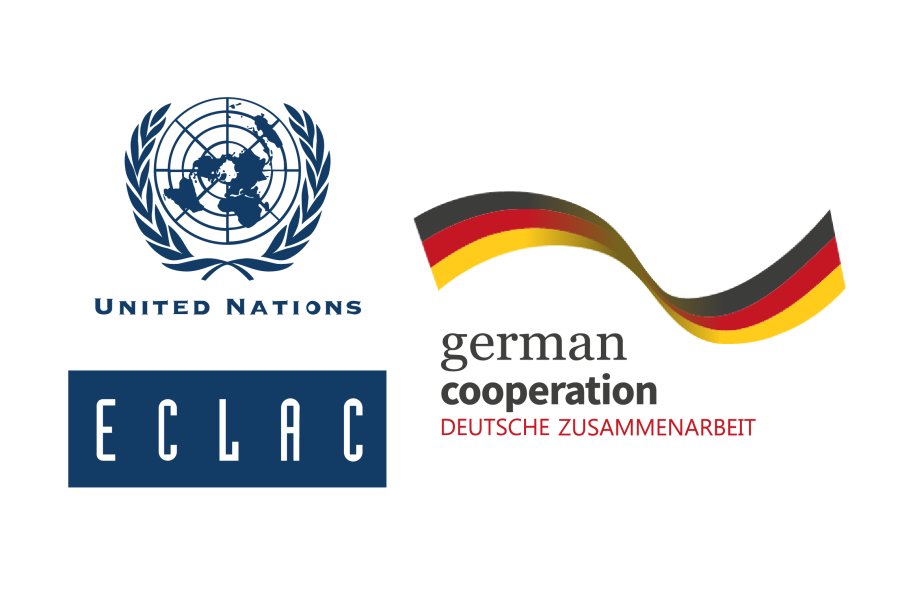Fourth Regional Seminar on Social Development "Social Protection and Inequality: Latin America and the Caribbean towards the Second World Summit for Social Development of 2025"
Work area(s)
Teaser
The objective of this seminar, organized by the Economic Commission of Latin America and the Caribbean (ECLAC) is to promote reflection and dialogue to advance in the recognition, analysis of the characteristics and dimensioning of social inequality in the region. Therefore, it seeks to strengthen the design of public policies that allow progress in inclusive social development and thus progress in meeting the goals agreed by the countries in the 2030 Agenda for Sustainable Development.
Event information

Date
25 - 27 Jun 2024, 05:30 - 10:00Event type
Participation
The cascade of crises that Latin America and the Caribbean have faced since the COVID-19 pandemic in 2020 generated strong deteriorations in poverty, inequality, and employment. Although since 2022 the region has shown a slight favorable trend of recovery in several dimensions of inclusive social development (ECLAC, 2023),[1] it is still mired in a double structural trap of low growth and important levels of poverty and inequality. Inequality is a historical and structural characteristic of this region, which has been maintained and reproduced even in periods of growth and economic prosperity (ECLAC, 2016).[2]
Inequality has been at the center of ECLAC's thinking and reflections in its 75 years of existence, contributing from an analysis at the interregional level, with the proposals on center-periphery dynamics in relation to sectoral asymmetries in economic development (ECLAC, 1951),[3] to the distribution of income, wealth, and the exercise of rights. The structural heterogeneity that characterizes the functioning of the productive systems of the countries of the region, in which low-productivity sectors generate most of the employment, is one of the determinants of inequality in the region. The labour market is the fundamental link between this productive structure and income inequality. It has been argued that this structural inequality is a major barrier to the development of the countries of the region, as well as to the eradication of poverty, the expansion of citizenship and the exercise of rights (ECLAC, 2010,[4] 2012[5] and 2014[6]). It is, moreover, inefficient because it has a negative impact on productivity, taxation, and environmental sustainability (ECLAC, 2018) .[7]
With the approach of the "Social Inequality Matrix" (ECLAC, 2016) as a guiding analytical framework, it is argued that, together with socioeconomic status, inequalities in economic well-being and rights are determined by structuring axes such as gender, those related to the different stages of people's life cycle (including intergenerational inequality), ethnic-racial origin, disability, migratory status and territory (such as urban segmentation and disadvantages in rural sectors), among others. These axes intersect and combine with each other, generating a multiplicity of factors and expressions of inequality (of well-being and exercise of rights) that accumulate over time.
In contexts of high labour informality and inequality, with wide gaps in the social protection systems that characterize the region, the lower strata often have to face uncertainty and individual and collective shocks at the cost of their present and future well-being. This vulnerability to poverty characterizes the middle sectors that have managed to escape poverty but, as the COVID-19 pandemic showed, any socioeconomic shock or crisis can cause them to fall back into poverty, especially when they are not sufficiently and timely covered by social protection systems.
Today there is widespread recognition of the relevance of addressing inequality and promoting social inclusion. This is clearly based on the rights-based approach and the recognition of the negative consequences it has on the development of capabilities and individual wellbeing. But it is also a necessary objective for economic growth and sustainable development, a centrality that is clearly highlighted in the 2030 Agenda for Sustainable Development and reflected in the public policy lines of action agreed by the countries of the region in the Regional Agenda for Inclusive Social Development (ECLAC, 2020). Progress in reducing inequality gaps is key to achieving inclusive social development and this is an inherent dimension of sustainable development in the region.
The objective of this seminar is to promote reflection and dialogue to advance in the recognition, analysis of the characteristics and dimensioning of social inequality in the region. Therefore, it seeks to strengthen the design of public policies that allow progress in inclusive social development and thus progress in meeting the goals agreed by the countries in the 2030 Agenda for Sustainable Development.
[1] Social Panorama of Latin America and the Caribbean 2023: labour inclusion as a key axis of inclusive social development (LC/PUB.2023/18-P/Rev.1).
[2] The social inequality matrix in Latin America (LC/G.2690).
[3] Estudio económico de América Latina 1949.
[4] Time for equality: closing gaps, opening trails. Thirty-third session of ECLAC (LC/G.2432(SES.33/3)).
[5] Structural change for equality: an integrated approach to development. Thirty-four session of ECLAC (LC/G.2524(SES.34/3)).
[6] Compacts for Equality: Towards a Sustainable Future (LC/G.2586 (SES.35/3)).
[7] The Inefficiency of Inequality (LC/SES.37/3-P).
Programme of work
DAY1 Opening Session
Moderator: Alberto Arenas de Mesa, ECLAC
- José Manuel Salazar-Xirinachs, Executive Secretary of ECLAC
- Manfred Haebig, Principal Advisor ECLAC-BMZ/giz Cooperation Programme
- Laura Oroz Ulibarri, Director, Directorate of Cooperation with Latin America and the Caribbean, Spanish Agency of International Cooperation for Development (AECID)
- Ximena Andión, Deputy Director for the Mexico and Central America Office, Ford Foundation
Keynote Speech "The role of social protection systems in welfare states to address inequality"
Moderator: Claudia Robles, ECLAC
- Nicholas Barr, Professor of Public Economics, London School of Economics and Political Science
Questions and comments from the audience (20 minutes)
Presentation(s)
Special presentation on the road to the Second World Summit for Social Development in 2025
Moderator: Rodrigo Martínez, ECLAC
Paula Narvaez, President of the United Nations Economic and Social Council (ECOSOC)
High-level panel "Inequality, mobility and social cohesion: rights and public policies"
Moderator: Daniela Trucco, ECLAC
-
José Wellington Barroso de Araújo Dias, Minister of Social Development, Brazil
-
Javiera Toro, Minister of Social Development and Family, Chile
-
Zaida Rovira, Minister of Economic and Social Inclusion, Ecuador
-
Andrea Costafreda, Programmatic Director for Latin America and the Caribbean, Oxfam Intermón
Presentation(s)
Presentation of ECLAC book "Non-contributory pension systems in Latin America and the Caribbean:Towards solidarity with sustainability"
Presentation(s)
Panel 1 "Social stratification and inequality"
Moderator: Carlos Maldonado, ECLAC
Objective: To present the main findings of recent work developed by ECLAC on a multidimensional and updated look at stratification and social classes in the region. To reflect on the results and public policy challenges that arise from these studies in the face of the new scenarios presented by the Fourth Technological Revolution, climate change, migration, and demographic transition.
-
Presentation: "Stratification and social classes in Latin America: dynamics and characteristics in the first two decades of the 21st century", Rodrigo Martinez, ECLAC (20 minutes)
-
Comments (40 minutes)
-
Pedro López-Roldan, Professor, Department of Sociology, Universitat Autònoma de Barcelona.
-
Eduardo Chávez, Researcher, Gino Germani Research Institute, University of Buenos Aires.
-
Emmanuelle Barozet, Professor at the School of Sociology, University of Chile, and COES researcher
-
-
Questions and comments from the audience (30 minutes)
Presentation(s)
DAY 2 Keynote Speech "Inequality and Social Rights"
Moderator: Rodrigo Martínez, ECLAC
-
Professor Sir Michael Marmot, Director of the University College London Institute of Health Equity
-
Questions and comments from the audience (20 minutes)
Presentation(s)
Panel 2 "Inequality in health in Latin America and the Caribbean: the persistence of gaps and injustices that hinder inclusive and sustainable social development"
Moderator: Raquel Santos Garcia, ECLAC
Objective: To present the relationship between the structural axes of the social inequality matrix, social determinants, and health gaps, both in terms of access and outcomes, highlighting the structural and unjust nature of these differences. It will reflect on how these constant inequalities limit and hinder inclusive and sustainable social development, taking into consideration the gaps in access to health, financing, outcomes, and the unequal distribution of the social determinants of health. Finally, it will reflect on the current reforms and efforts that the countries of the region are making in their health systems to overcome the effect of inequality on people's health.
-
Presentation: "Inequality and health in Latin America and the Caribbean: key dimensions for advancing towards inclusive and sustainable social development", María Luisa Marinho, ECLAC (20 min)
-
Presentation: "The social determinants of health and their central role in overcoming inequality", Orielle Solar, Chief of the Health Promotion and Social Determinants Unit, Department of Social and Environmental Determinants for Health Equity, PAHO/WHO (20 min)
-
Comments (25 min)
-
Osvaldo Salgado, Undersecretary of Health Care Networks, Chilean Ministry of Health
-
Zaida Rovira, Minister of Economic and Social Inclusion, Ecuador
-
-
Questions and comments from the audience (25 minutes)
Presentation(s)
Panel 3 "Advancing towards a measurement of educational inequality in Latin America and the Caribbean"
Introduction and moderation of the panel: Daniela Trucco, ECLAC (15 min)
Objective: To discuss how to measure and analyze educational inequality in the region based on a proposal being developed by ECLAC. Eliminating educational inequalities is key to strengthening the role of education as an essential axis for inclusive social development, a fundamental basis for sustainable development. To this end, it is essential to have indicators that make it possible to measure educational inequality and identify its main determinants, and thus contribute to the debate on how to reduce it.
-
Panelists (60 minutes)
-
Claudia Costin, President of the Singularidades Institute, Brazil
-
Cristián Bellei, Universidad de Chile
-
Sylvia Shmelkes, education researcher from Mexico
-
Mariana Huepe, ECLAC
-
-
Questions and comments from the audience (15 minutes)
Presentation(s)
Side event "Inequalities in Early Childhood: strategic and fundamental approaches for inclusive social development"
Inequalities in early childhood: strategic and indispensable approaches to inclusive social development
Presentation(s)
Presentación Raquel Santos Garcia_Yannig Dussart
Panel 4 "Inequality and pension systems in Latin America: strategic elements for reform processes"
Moderator: Nincen Figueroa, ECLAC
Objective: Pension systems fulfill various objectives, including reducing inequalities in access and levels of income protection in old age. The panel will discuss strategic elements and dimensions that can be addressed in the design of pension systems and their reform discussions in order to contribute to the reduction of inequalities and inclusive social development in the region.
-
Presentation: "Moving towards sustainable pension systems in Latin America with the reduction of inequalities at the center", Claudia Robles, ECLAC (20 minutes)
-
Presentation: “Pension systems and their contribution to the reduction of gender inequalities and migrants in Ibero-America", Gina Magnolia Riaño, Secretary General of the OISS (20 minutes)
-
Comments (30 minutes)
-
Victorhugo Montoya, Institutional Head of the Office of Social Security (ONP), Peru
-
Nicholas Barr, Professor of Public Economics, London School of Economics and Political Science, (20 minutes)
-
Questions and comments from the audience (20 minutes)
Presentation(s)
DAY 3 Keynote Speech "Conceptual debates and challenges for the measurement of social Inequality"
Moderator: Daniela Trucco, ECLAC
-
François Bourguignon, Emeritus professor of economics at the Paris School of Economics
-
Comments and questions from the audience (20 minutes)
Presentation(s)
Panel 5 "Tackling inequalities to achieve labour inclusion in Latin America and the Caribbean"
Moderation: Amalia Palma, ECLAC
Objective: Labour markets in Latin America and the Caribbean are undergoing significant changes that threaten to deepen existing inequalities. Active labour market policies, in coordination with social protection policies, play a vital role in addressing this phenomenon. Promoting labour inclusion through these policies offers a way out of the current situation by providing better opportunities and conditions for workers, especially for those who are most vulnerable. The objective of this panel will be to present and discuss recent evidence on the efforts being made by the countries of the region in this area.
-
Presentation: "Addressing inequalities through active labour market policies", Andrés Espejo, ECLAC (20 min)
-
Comments (40 min)
-
Verónica Escudero, Research Department of the International Labor Organization (ILO)
-
Andrea Repetto, Director of the School of Government, Universidad Católica
-
Rodrigo Oliveira, Associate Researcher, UNU-WIDER
-
-
Questions and comments from the audience (30 minutes)
Presentation(s)
Panel 6 "Towards a social inequality index"
Moderation: Andrés Espejo, ECLAC
Objective: To discuss a proposal for a multidimensional measurement of social inequality. It is expected to make a presentation that shows the limitations of having an income-based measurement and promotes the use of a multidimensional index of social inequality for the region.
-
Introduction: "Proposal for a comprehensive index of inequality", Alberto Arenas de Mesa, ECLAC (20 minutes)
-
Panelists (60 minutes)
-
Emma Santos, Associate Professor of Economic Policy, Dept. of Economics, Universidad Nacional del Sur (UNS), Argentina
-
Verónica Amarante, Director of the Economics Institute of the Universidad de la República (Udelar) en Uruguay
-
David Bravo, Director of the UC Center for Surveys and Longitudinal Studies, Universidad Católica de Chile
-
Rafael Carranza, Assistant Professor, School of Government, Universidad Católica de Chile
-
-
Questions and comments from the audience (10 minutes)
Closing remarks
Alberto Arenas de Mesa, ECLAC
Side event “Social cohesion for inclusive social development in Latin America: monitoring, challenges and opportunities in a context of uncertainties”
Practical information
Hybrid event with simultaneous interpretation spanish-english and sign language
Related content

ECLAC Calls for Comprehensive Policies to Address the Trap of High Inequality and Low Social Mobility in which Latin America and the Caribbean is Caught
José Manuel Salazar-Xirinachs, Executive Secretary of the United Nations regional organization, led today’s inauguration of the Fourth Regional Seminar on Social Development on social protection and…

ECLAC’s Fourth Regional Seminar on Social Development Will Take Place on June 25-27, Focused on Social Protection and Inequality
The event seeks to strengthen the design of public policies aimed at reducing inequality and achieving progress on inclusive social development in Latin America and the Caribbean.
Related link(s)
Related project(s)
Contact
Daniela Huneeus
- daniela.huneeus@cepal.org
- (56 2) 2210 2099

